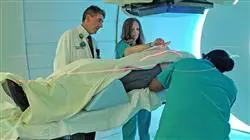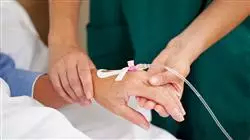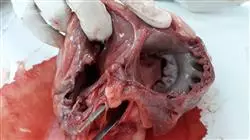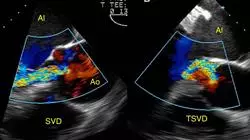University certificate
The world's largest faculty of medicine”
Description
Improve your knowledge in Cardio-Oncologythrough this program, where you will find the best teaching material with real case studies. Learn here about the latest advances in the specialty to be able to provide quality medical care"

Due to the growing importance of this clinical process, in recent years "multidisciplinary teams formed mainly by cardiologists and oncologists that make up the so-called Cardio-Oncology Units" have been developed.
The objective of the professional master’s degree in Cardio-Oncology is to offer up-to-date training in an area of current and future relevance from the clinical point of view, in which knowledge is advancing at breath-taking speed, focused on the training of professionals interested in the subject.
The professional master’s degree will have two main axes around which all its modules will revolve: “Research and clinical applications”. All sections will be approached from the perspective of the most recent research findings. From the research point of view, both "basic and clinical research" lines will be addressed. The research background of the directors and co-directors of the professional master’s degree will be reflected in all the modules. As this is a professional master’s degree with a clinical application vocation, all modules will be introduced, and their content will be "applied to real clinical cases".
Cardiologists, oncologists, and hematologists with special interest in this field have, with this professional master’s degree, the opportunity to complete and update their knowledge in Cardio-Oncology. The final objective of this professional master’s degree will be for students to learn the "pathophysiological basis of the onset of CT, as well as how to detect and treat" it. Students will get to know, understand and apply the latest diagnostic techniques, and preventive and therapeutic measures specific to CT in oncology patients.
Emphasis will be placed on "solving complex clinical problems" such as the need for chemotherapy treatment in patients with severe heart disease or the occurrence of acute cardiovascular events in oncology patients undergoing chemotherapy treatment. It also offers a unique opportunity to learn about the latest advances in research in this field and aims to encourage students' interest in research.
Update your knowledge through the Cardio-Oncology program”
This professional master’s degree in Cardio-Oncology contains the most complete and up-to-date scientific program on the market. The most important features of the program include:
- More than 75 clinical cases presented by experts in Cardio-Oncology
- The graphic, schematic, and eminently practical contents with which they are created provide scientific and practical information on the disciplines that are essential for professional practice
- Diagnostic-therapeutic developments on assessment, diagnosis, and treatment in Cardio-Oncology
- It contains practical exercises where the self-evaluation process can be carried out to improve learning
- Clinical and diagnostic imaging and testing iconography
- Algorithm-based interactive learning system for decision-making in the presented clinical situations
- With special emphasis on evidence-based medicine and research methodologies in Cardio-Oncology
- All this will be complemented by theoretical lessons, questions to the expert, debate forums on controversial topics, and individual reflection assignments
- Content that is accessible from any fixed or portable device with an Internet connection
This professional master’s degree may be the best investment you can make when selecting a refresher program, for two reasons: in addition to updating your knowledge in Cardio-Oncology, you will obtain a qualification from TECH"
The teaching staff includes professionals from the field of Cardio-Oncology, who bring their experience to this training program, as well as renowned specialists from leading scientific societies.
The multimedia content developed with the latest educational technology will provide the professional with situated and contextual learning, i.e., a simulated environment that will provide immersive training program to train in real situations.
This program is designed around Problem Based Learning, whereby the medical must try to solve the different professional practice situations that arise throughout the course of the professional master’s degree. For this purpose, the physician will be supported by an innovative interactive video system created by renowned and experienced experts in the field of Cardio-Oncology and other disciplines, with extensive teaching experience.
The professional master’s degree provides training in simulated environments, which provides immersive learning designed to train professionals for real situations"

It includes clinical cases to bring the program's degree as close as possible to the reality of medical care"
Objectives
The professional master’s degree in Cardio-Oncology is aimed at improving the performance of physicians dedicated to the treatment of cardiologic problems related to oncologic processes.

This program is designed for you to update your knowledge in Cardio-Oncology, using the latest educational technology to contribute with quality and safety to decision making, diagnosis, treatment and patient care"
General Objectives
- Update Cardiologists, Oncologists, and Hematologists's knowledge in the field of Cardio-Oncology
- Promote work strategies based on a comprehensive approach to the patient as a standard model for achieving excellent care
- Encourage the acquisition of technical skills and abilities, through a powerful audiovisual system, and the possibility of development through online simulation workshops and/or specific training
- Encourage professional stimulation through continuous education and research
Specific Objectives
- Know the epidemiological relevance of cancer
- Know the clinical and epidemiological importance of cardiac toxicity
- Identify the epidemiological importance of prevention and early detection of cardiotoxicity
- Learn the objectives of Cardio Oncology Units
- Know the structure and organization of Cardio Oncology Units
- Define the concept of cardiotoxicity
- Learn the types of cardiotoxicity depending on the area affected
- Learn the types of cardiotoxicity according to the pathophysiological mechanism
- Understand the molecular and tissue mechanisms leading to CT
- Recognize the cardiotoxic effects of thoracic radiotherapy
- Update the knowledge concerning the evolution of thoracic radiotherapy equipment and methods
- Explain the factors influencing acute and chronic radioinduced cardiotoxicity
- Recognize chemotherapeutic drugs implicated in cardiotoxicity
- Analyze the cardiotoxic effects of anthracyclines
- Explain the cardiotoxic effects of anti-tubulin drugs
- Explain the cardiotoxic effects of antimetabolite drugs
- Explain the cardiotoxic effects of alkylating agents and other drugs that interact with DNA
- Analyze the cardiotoxic effects of biological agents, specifically trastuzumabtype monoclonal antibodies
- Become familiar with other potentially cardiotoxic biological agents
- Analyze the cardiotoxic effects of cell kinase inhibitors
- Be aware of other potentially cardiotoxic oncological treatments as antiangiogenic drugs, histone deacetylase inhibitors, differentiation and/or apoptosis inducers and hormone therapy
- Understand the individual susceptibility factors, both genetic and acquired, involved in the development of cardiac toxicit.
- Be able to perform a comprehensive risk assessment of patients undergoing oncologic treatment
- Describe the monitoring required by patients during treatment with cardiotoxicity therapies
- Identify biomarkers as a method used to detect cardiotoxicity early, especially troponins and natriuretic peptides
- Delve into the knowledge of echocardiography, with special attention to the "global longitudinal strain" technique as a marker for early detection of cardiac toxicity
- Know the role of cardiac magnetic resonance imaging in the early detection of cardiotoxicity
- Recognize the clinical relevance and mechanisms involved in the onset of ventricular dysfunction and heart failure secondary to cardiac toxicity
- Deepen our knowledge of myocardial involvement caused by anthracyclines
- Identify other chemotherapy drugs with the capacity to produce myocardial toxicity
- Deepen our knowledge of myocardial toxicity induced by monoclonal antibodies, especially tratuzumab
- Recognize the ability of therapies directed against novel molecular targets (cellular kinase inhibitors) and proteosome inhibitors that cause ventricular dysfunction and heart failure
- Learn the effects of thoracic radiotherapy on the myocardium
- Improve knowledge in the clinical diagnosis of heart failure associated with cardiotoxicity
- Acquire updated knowledge in the treatment of heart failure and ventricular dysfunction related to oncological treatments
- Know the importance of early detection of myocardial involvement due to cardiotoxicity
- Describe the appropriate action to be taken in the event of an increase in circulating biomarkers during oncologic treatment
- Describe the appropriate response to the appearance of "global longitudinal strain" alteration during oncological treatment.
- Learn the monitoring strategy during treatment with anthracyclines
- Learn the monitoring strategy during treatment with monoclonal antibodies, especially trastuzumab
- Learn the monitoring strategy during treatment with cell kinase inhibitors
- Understand the potential causes and mechanisms of ischemic heart disease in the context of cardiac toxicity
- Identify patients at high risk of coronary artery disease
- Define the role of oncological treatments such as fluoropyrimidines in the development of ischemic heart disease
- Acquire updated knowledge on diagnostic methods for coronary artery disease related to cardiotoxic drugs
- Get up to date on the management of acute coronary syndrome in the context of oncologic treatment
- Learn the monitoring strategy in patients who have had coronary ischemia
- Know the clinical relevance of thoracic radiotherapy in the development of coronary artery disease and its mechanisms
- Recognize the risk factors for the development of ischemic heart disease in patients who have received thoracic radiotherapy
- Expand knowledge of the diagnostic methods of radiation-induced coronary artery disease
- Analyze the treatment options in coronary artery disease associated with thoracic radiotherapy
- Improve knowledge of the treatment strategy for chronic ischemic patients receiving oncologic treatment
- Know the arrhythmogenic capacity and clinical relevance of cardiac toxicity
- Learn the oncological treatments with the capacity to prolong the QT interval of the electrocardiogram and the factors that increase the probability of this occurring
- Acquire in-depth knowledge of the electrocardiographic diagnosis of QT interval prolongation
- Know the risk of developing ventricular arrhythmias and their specific treatment
- Identify strategies to prevent prolongation of the QT interval on the electrocardiogram
- Define the implications of prolongation of the QT interval on the electrocardiogram and the appearance of ventricular arrhythmias on the continuity of specific treatment
- Recognize the clinical relevance and mechanisms of atrial tachyarrhythmias, especially atrial fibrillation in oncologic patients
- Learning about cancer treatments that favor the development of atrial fibrillation
- Analyze the need for anticoagulation and its risk-benefit in oncologic patients with atrial fibrillation
- Review therapeutic options in atrial fibrillation in the context of cardiotoxicity
- Recognize the clinical significance of bradyarrhythmias related to oncologic treatment
- Learn the oncological treatments that are associated with the development of bradyarrhythmias and their therapeutic implications
- Know the potential toxic effects of oncological treatments at the valvular level
- Update knowledge on the attitude towards chronic valvular patients and prosthetic valve patient receiving oncological treatment
- Know the potential toxic effects of oncological treatments on the pericardium
- Learn the treatment strategy for patients with pericardial effusion secondary to cardiac toxicity
- Recognize the specific role of radiotherapy in the development of pericardial disease
- Define the assessment of metastatic pericardial involvement
- Recognize the clinical relevance of hypertension in oncologic patients
- Analyze the relationship between antiangiogenic drugs and arterial hypertension and its mechanisms
- Deepen the knowledge of the diagnosis of arterial hypertension associated with the use of antiangiogenic drugs
- Define the strategy for monitoring arterial hypertension during oncologic treatment
- Know the treatment of arterial hypertension related to oncologic treatment
- Recognize the clinical relevance of venous thromboembolic disease in oncologic patients
- Know the different factors and situations that contribute to the development of venous thromboembolic disease in oncologic patients
- Learn the antineoplastic treatments associated with increased risk of venous thromboembolic disease
- Describe prevention measures for cancer-related venous thromboembolic disease in different clinical scenarios
- Analyze the relationship and clinical significance of venous thromboembolic disease with the use of central venous catheters
- Learn the forms of clinical presentation, diagnostic and follow-up methods, as well as the treatment of venous thromboembolic disease with the use of central venous catheters
- Know the methods of prevention of venous thromboembolic disease with the use of central venous catheters
- Identify the forms of presentation and deepen the knowledge of the diagnosis of deep vein thrombosis and cancer-associated pulmonary thromboembolism
- Analyze the different therapeutic options for cancer-associated thromboembolic disease
- Know the capacity of some oncological treatments to produce arterial thrombosis
- Recognize the clinical relevance and pathophysiological mechanisms of peripheral vascular disease in the oncologic patient
- Know the treatments involved in the early development of peripheral vascular disease
- Recognize the clinical significance and mechanisms involved in the occurrence of cerebral vascular disease in relation to oncological treatments
- Know the oncological treatments associated with the appearance of cerebral vascular disease
- Learn the relationship of some oncological treatments with the development of pulmonary hypertension
- Define strategies to identify and control risk factors to limit the development of cardiotoxicity related to oncologic drugs
- Know the measures capable of limiting cardiac toxicity due to anthracyclines
- Know the measures capable of limiting cardiac toxicity due to trastuzumabtype monoclonal antibodies
- Know the measures capable of limiting cardiac toxicity related to cellular kinase inhibitors
- Learn strategies to limit the risk of toxicity related to radiotherapy.
- Analyze the role of beta-blockers in cardioprotection
- Analyze the role of angiotensin receptor inhibitors and antagonists in cardioprotection
- Identify other pharmacological treatments with a possible cardioprotective effect
- Become familiar with the follow-up required in patients with cardiac toxicity or at high risk of developing it
- Explain the long-term follow-up of patients who have received thoracic radiotherapy.
- Understand the occurrence and determine the clinical management of patients with established oncologic disease who present with an acute ischemic event
- Understand the occurrence and determine the clinical management of pediatric patients requiring potentially cardiotoxic oncologic treatment
- Understand the onset and determine the clinical management of geriatric patients requiring oncologic treatment
- Get up to date on anticoagulant and antiplatelet therapy in oncology patients
- Broaden knowledge in relation to oncology patients with arrhythmias and require implantable devices (pacemakers, defibrillators)
- Recognize the importance of research in the context of cardiotoxicity
- Become familiar with current basic lines of research and future perspectives

Take the opportunity and take the step to get up-to-date on the latest developments in Cardio-Oncology”
Professional Master's Degree in Oncologic Cardiology
Cancer and cardiovascular diseases have shared links for many years, especially if the risk factors are examined. However, there is a common point of greater weight that links them, and that is that about a third of cancer patients have heart conditions, both due to side effects of chemotherapy, as well as for not having heart-healthy habits that accompany the treatment. In order to provide medical personnel with the aptitudinal tools to enhance their intervention in this field, TECH Technological University presents the Professional Master's Degree in Oncological Cardiology, a program structured in a 100% online format that synthesizes in fifteen thematic modules the fundamentals, particularities and pathophysiological approaches of cardiovascular problems derived from cancer procedures, especially cardiac toxicity in its multiple forms. Topics such as oncological therapies with cardiotoxic effect, myocardial toxicity, ischemic heart disease and arrhythmias in the face of cardiotoxicity, among others, will be addressed and dissected in autonomous classes where you will be able to distribute your time and study space.
All about oncologic cardiology in an online Professional Master's Degree
Multiple studies show that certain antineoplastic drugs used in oncology such as anthracyclines can cause considerable damage to the heart muscle. This is known as cardiotoxicity and initially usually manifests as a cardiomyopathy that later evolves into heart failure or even arrhythmia. When this occurs, physicians, cardiologists, oncologists and other interdisciplinary positions are needed, rigorously prepared to make an accurate early diagnosis and implement the corresponding treatment measures. Thanks to our postgraduate program, you will be able to acquire competencies to perform in this field under the highest academic and scientific standards. We will instruct you in therapies with cardioprotective effect, venous thromboembolic disease and other vascular complications in oncology patients, valvular and pericardial involvement related to cardiotoxicity, among other multiple aspects that will provide your professional profile with a pleasantly beneficial step in clinical and hospital positions. Do you want to take your career to the next level? Opt for the best online university in the world.







